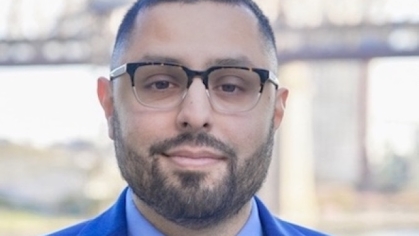New Faculty Research Aims to Build Innovative Partnership to Prevent Opioid Use Disorder
Dr. Qiana L. Brown, Assistant Professor at Rutgers School of Social Work, was awarded a $10,000 NIH/NCATS/CTSA pilot award through the New Jersey Alliance for Clinical and Translation Science (NJ ACTS – a Rutgers-led NCATS/CTSA program hub). The pilot award, entitled The COP Study: Communities and Officers Working Together to Prevent Opioid Use Disorder, aims to build an innovative, community-academic-police partnership (CAPP) to guide the development and implementation of the New Jersey State Police (NJSP)-led wastewater-based epidemiology opioid use surveillance pilot program in Camden County, New Jersey.
“This study is important because the US opioid epidemic is ubiquitous and in Camden County, New Jersey opioid overdose fatalities increased nearly 370% from 89 total fatalities in 2010 to 329 in 2018,” said Dr. Brown. According to the Drug Enforcement Administration (DEA), heroin is the leading threat in New Jersey. There is a clear need for better, more effective, multidisciplinary, population-based prevention efforts to prevent opioid overdose, both fatal and non-fatal, as well as to prevent opioid misuse and disorder (antecedents to overdose), especially given the gaps in both access to and availability of treatment. Using wastewater-based epidemiology opioid use surveillance methods (e.g., examining municipal wastewater for opioids and their metabolites) can potentially provide timely, valid, population-based data on opioid use, which can be used to deploy prevention resources to communities in the most need. However, technical (e.g., best practices) and ethical challenges with this approach need to be addressed in collaboration with the community before implementing such surveillance programs in the community. For example, many questions remain about how to ethically collect, analyze and interpret wastewater-based epidemiology data used for substance-use surveillance—data community members are often unaware are being collected.
“Our proposed project will help address these issues through communitybased participatory research (CBPR), which will provide the community with an opportunity to offer input and work collectively with academics, law enforcement and other stakeholders (e.g., clinicians, public health practitioners) to address any concerns regarding the NJSPled wastewater-based epidemiology opioid use surveillance pilot program before the program is implemented,” said Dr. Brown. “While research posits that many ethical concerns, including fears around police use of wastewater-based epidemiology methods, are unlikely to be realized, no studies, to our knowledge, have directly interviewed community members in neighborhoods where wastewater-based epidemiology opioid use surveillance programs are being implemented to attain a deeper understanding of concerns and to work with communities to address trepidations. Implementing such surveillance programs in communities without the communities’ knowledge and input is a missed opportunity to develop communityinformed prevention interventions,” said Dr. Brown.
To this end, the Rutgers School of Social Work, Rutgers School of Engineering and the NJSP have partnered to implement The COP Study. From the base of this core partnership, a more extensive CAPP will be developed. Community members, community- and faith-based organizations, researchers, social workers, clinicians, public health practitioners, engineers and police officers will be invited to join the CAPP. Ultimately, the CAPP will help ensure that the NJSP-led wastewater-based epidemiology opioid use surveillance pilot program is tailored to the needs of the community and consumers of opioid prevention services.
Key personnel for this study includes Dr. Qiana L. Brown (principal investigator from Rutgers School of Social Work); Dr. N. Andrew Peterson (Professor and Associate Dean for Research at Rutgers School of Social Work and co-investigator); Dr. Nicole Fahrenfeld (Associate Professor at Rutgers School of Engineering and co-investigator); and Lt. Adam Polhemus (co-investigator from NJSP).



